Our Territories
Channel Islands
England
Ireland
Isle of Man
Scotland
Wales
Our Categories
Home | Set 1 | Set 2 | Set 3 | Set 4 | Set 5 | Set 6 | Set 7 | Set 8 | Set 9 | Set 10
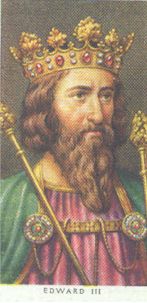 |
Edward III Edward III was a grand fighter and a capable administrator. His ambition to conquer Scotland and France plunged England into the fruitless Hundred Years' War. A series of sensational victories at Crecy, Calais and Poitiers made Edward, and his son, the Black Prince, the most renowned warriors in Europe. But neither French loot, nor the ransoms of the Scottish and French Kings, nor a skilful commercial policy, could pay for their continual campaigning. As Edward grew older, his vices and extravagance made him disliked. A population halved by the Black Death groaned under heavy taxes, and Edward's reign closed in gloom and distress. |
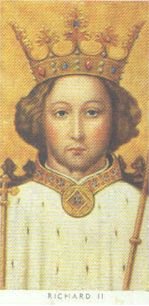 |
Richard II At the age of fourteen the son of the Black Prince showed his courage in facing an angry crowd at Mile End. He took charge of the government at twenty-two, and made a genuine effort to preserve peace. Tournaments and pageants made England a merry place for the wealthy, but there was want and pestilence among the poor. Queen Anne's sudden death completely unbalanced Richard. His extravagance passed all bounds; acts of revenge and tyranny turned his subjects against him. When Henry Bolingbroke returned from exile, thousands joined him, and Richard was deposed, dying mysteriously in Pontefract Castle soon afterwards. |
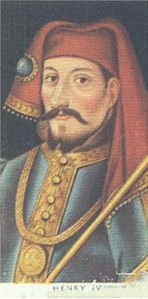 |
Henry IV A far-sighted young man, Henry Bolingbroke spent his youth making himself popular in England and abroad. At the right moment he deposed his unlucky cousin, Richard II, and made himself King. The new monarch quickly learned how "uneasy lies the head that wears the crown;" his brief reign was largely taken up with maintaining his position against frequent rebellions. As a youth Bolingbroke was attractive: physically imposing, though his health was poor; rather reserved, but courteous: on occasion very witty; virtuous at a time of much depravity. In later life he suffered from disease, and died at the age of forty-five. |
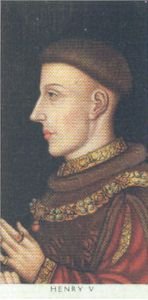 |
Henry V Henry's youth was merry, but on succeeding his father he devoted his whole attention to government. He conciliated the clergy by repressing heresy, gave Parliament more power in return for money, and pleased the nobles by invading France, "in pursuit of homour." Inspired by the King's leadership, the "little band of brothers" defeated a huge French army at Agincourt. On a second expedition Henry captured Rouen, was recognized as the next King of France and married Princess Katherine. Two years later he was dead. By his contemporaries Henry was regarded as an ideal King-brave, cheerful, considerate and modest. |
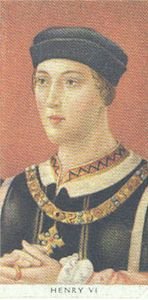 |
Henry VI Fate cast this son of the warrior Henry V into a sea of troubles. The war party in England was strong and the impossible attempt to hold his father's conquests in France continued. The House of York challenged Henry VI's right to the throne, and England was plunged into civil war. Frequently a fugitive, sometimes a prisoner, at best a puppet of Warwick "the King-maker," the half-crazy King, consoled by religious exercises, patiently submitted to the grossest indignities, culminating in his murder in the Tower. Eton and King's College, Cambridge still revere their founder's "holy shade." |
Home | Set 1 | Set 2 | Set 3 | Set 4 | Set 5 | Set 6 | Set 7 | Set 8 | Set 9 | Set 10